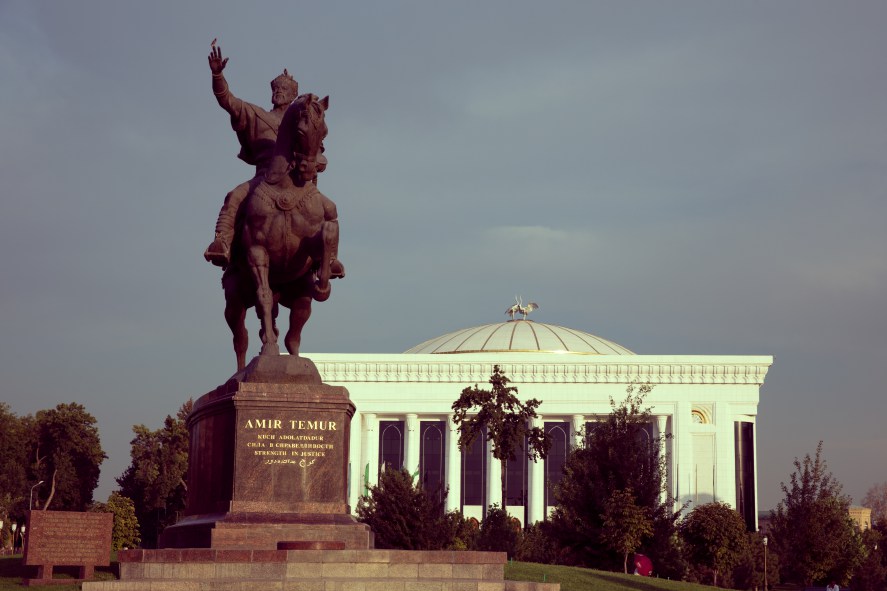“I think that this country [Uzbekistan] – as a dynamic reformer right now – is in a wonderful position to be a regional trailblazer…and show others an example,” says Joanna Lillis, a Kazakhstan-based journalist reporting on Central Asia whose work has featured in the Guardian, The Economist and the Independent newspapers, who is also the author of Dark Shadows: Inside the Secret World of Kazakhstan.

Read in Uzbek
What do you think of the current reforms in Uzbekistan? In your view, has the West finally started to believe in the Uzbek reforms?
I think that the current reforms that are under way in Uzbekistan are extremely positive for the country and for its people. Since Shavkat Mirziyoyev came to power in 2016, he has embarked on a truly ambitious and far-reaching reform programme that is designed to modernize Uzbekistan, dismantle some of the most egregious elements of the legacy of the Karimov years and embrace greater openness: politically, economically, socially, and internationally.
The economic reforms have been really striking, from the currency reforms that have all but rid Uzbekistan of its black market to the broadly successful efforts to root out forced labour from the cottonfields. Both of these elements were throwbacks to the Soviet past, and their virtual eradication are vivid signs that the country is really changing. There have been a host of other economic reforms, from tax reforms to agricultural reforms and many more, all designed to root out the principles of the command economy that has failed the Uzbek people over the past decades and to set Uzbekistan on the path to becoming a market economy from which the people can – I hope – benefit. What is also striking is the rapid pace of reform – the government is trying to achieve in years what other countries have tried to do over decades.
Naturally, this is an extremely complex process, and there are obstacles along the way – not least vested interest who resist reforms because they were benefiting from the status quo ante. Some such people have been removed from positions of political and economic power, but I think the authorities need to be careful that they don’t end up with a kind of crony capitalism favouring those who are now in power and in political favour. Here, I’m thinking of things like the involvement of business interests linked to Jakhongir Artikhojayev, the mayor of Tashkent, in building major projects like Tashkent City. Of course, he has removed himself from the day-to-day management of Akfa Group while he is mayor, but he said he had not sold his shares in it. I think it was quite a bold decision to put a successful businessman in as mayor of Tashkent and shake up the sluggish way that towns and cities have been run in Uzbekistan for many years, but at the same time I think the government has to be very careful to make sure there are no conflicts of interest.
I also think the government needs to make sure reforms are seen through to the end – there is a danger of running out of steam when things move so dynamically. For example, Uzbek citizens still can’t make cash purchases of hard currency inside Uzbekistan. Why not? There is no good reason for that, and in a market economy, they should be able to. Likewise, on cotton and forced labour – the government needs to root it out entirely, and they should think carefully about the model of the cotton sector and whether the state quota system is compatible with a market economy. Other priorities including boosting small and medium-sized businesses, and combating endemic corruption, which will be hard in the face of vested interests resisting.
Politically, President Mirziyoyev has set himself up as a president for the people, moving to make government more accountable to those it governs, using social media and public receptions where people can contact those in power – from the president down – to solve grievances. Where Islam Karimov was distant from the people, it is clearly visible that Shavkat Mirziyoyev wants to be more approachable. That is obviously a positive move. He has also made it clear that he wants officials at all levels to be more approachable and abandon the bullying and dictatorial management styles of the past. We can recall the scandal last year over the men made to stand in a ditch and carry lumps of clay as a punishment for allegedly not looking after agricultural land properly, which led to the firing of the deputy prime minister. Under Islam Karimov, that kind of ruling style was the norm; President Mirziyoyev has tried to make it clear he will not tolerate it, but the incident itself revealed how widespread it is and how hard to root out. Overall, though, there is no denying that government is becoming more accountable to the people, and the people are becoming more demanding of their government (national and local). That is how it should be!
However, politically Uzbekistan has a long way to go to become a democracy: there are still no opposition parties in existence, let alone in parliament, and there were no genuine opposition candidates in the presidential election in 2016 that cemented President Mirziyoyev in power. I think if the government can embrace economic reforms at such a rapid pace, it should also speed up political reforms to embrace genuine plurality and allow the people to have a real political voice at last. This is beneficial for the government too, as it promotes discussion which promotes innovation and leads in general to better governance and a more competitive country.
The government has been bolder in embracing some reforms that are intended to better uphold the rule of law and secure human rights and freedom of speech, from the freeing of many political prisoners and the removal of “suspect” people from religious blacklists to the loosening of the screws on the Uzbek media and the accreditation of foreign journalists – such as myself – to report from Uzbekistan. These are all very welcome moves. The government has also accepted Human Rights Watch back in after years when it could not operate in Uzbekistan. All this is extremely positive, and shows what a different country Uzbekistan is from just three years ago.
When it comes to human rights, I think that judicial reform is pressing. Reforms have been undertaken, but I think that – notwithstanding President Mirziyoyev’s welcome reforms of the domestic intelligence service and attempts to make it more accountable – the security forces, the criminal justice system and the judiciary are the source of many human rights abuses. This is true in many post-Soviet countries, and it seems to me that radical overhauls of these systems to instil true respect for human rights and the principle that a person is innocent until proven guilty are pressing – not just in Uzbekistan, but I think that this country – as a dynamic reformer right now – is in a wonderful position to be a regional trailblazer on this and really tackle this issue and show others an example. I would add here that the case of Gulnara Karimova is a litmus test for the government’s commitments to upholding rule of law: whatever her crimes, and however unpopular she may be in the country, she has the same right to justice as anyone else. There is a certain lack of transparency in the way her proceedings have been conducted, and it would be helpful to shed full light on the trials, the crimes she has been convicted of and the conditions in which she is being held. Another case that is arousing concern is that of Kadyr Yusupov, a former diplomat who is now being tried on treason charges in closed proceedings amid mysterious circumstances, given that he left the foreign service years before the alleged espionage took place; he suffers from schizophrenia, and he was arrested after a suicide attempt. I think it is important that Uzbekistan should demonstrate adherence to the rule of law to its own people and to the international community, including investors.
Internationally, Shavkat Mirziyoyev’s willingness to engage with a variety of countries (from Russia and China to Western states) after years of isolation has been welcomed enormously. Tashkent’s regional engagement has been an engine for greater engagement between Central Asian countries, and Afghanistan, has been a gamechanger too.
As for whether the West believes in the Uzbek reforms, I would say that broadly speaking it does. The fact that Uzbekistan is no longer an international pariah but is welcomed in foreign countries and on the world stage speaks for itself! I think the international business community also believes in the reforms, albeit cautiously, and I think that Western businesses will be investing much more greatly in Uzbekistan than in the past. That is already evident.
I have visited Uzbekistan several times since President Mirziyoyev came to power, and the sense of optimism among ordinary people is palpable: many say they breath more easily and feel more confident in the future. There is no denying that Uzbekistan has many, many problems still, especially when it comes to assuring political and civil liberties, but the trajectory is positive. Let’s hope it remains that way in the years to come.
In your position as a correspondent, what would you focus on? What
do The Economist readers want to know about Uzbekistan?
I will be focusing on all of the above, for a start! We will be reporting on how Uzbekistan continues the reform process, politically, economically, socially, and what this means for its citizens and for domestic and international investors. I want to cover stories that show how life is changing for ordinary Uzbeks, as well as stories that show the impact of the changes for the business community. This year Uzbekistan is due to hold a parliamentary election, and I think that will be a very interesting story to report on.
We have certainly seen a lot of good news stories in the western media over the past couple of years about Uzbekistan, which is great, and I am sure we will find lots of positive developments to report on. Naturally, we won’t shy away from covering the problems the country and its people face, too.
How credible are accounts that tourists are flooding into Uzbekistan?
I don’t have figures to hand, but I have certainly noticed that there seem to be more visitors – particularly independent travellers rather than tour groups, which is a positive thing for the country because profits from tour groups often go to foreign companies but independent travellers tend to spend more locally.
One gamechanger for the tourist industry has been the abolition of visas for many countries, which is such a simple but effective way of boosting tourism. As well as making it less bureaucratic to visit, it makes a country look open, welcoming and friendly – and Uzbekistan is certainly all those things. When you talk to tourists visiting Uzbekistan, they are often in raptures over everything from the incredible architectural sights to the warm people and delicious food – quite rightly so! It is encouraging to see Uzbekistan more open to visitors, and there are exciting and innovative things happening which will bring more visitors, like the Stihia Music Festival at Moynaq beside the dried-up Aral Sea that was held last year and is due to take place again this year. Generally, visitors take home positive impressions and spread the word, which will help boost the tourist sector.
Do you feel any restrictions on the media in Uzbekistan?
The domestic media is still very tame by Western standards. Obviously, self-censorship remains a problem, and no-go areas – such as personal criticism of President Mirziyoyev – clearly still exist. Anecdotal evidence suggests powerful local officials exert pressure on journalists in the regions. I think there need to be more efforts to ensure media freedoms in deeds as well as in words. Officials, from the president down, have to get used to accepting healthy and constructive criticism. That is what makes a healthy and constructive society.
What interesting details have changed since you first came to the region?
I first visited Central Asia (Kyrgyzstan) in 1998, and I first visited Uzbekistan in 2001, when I moved to the country to work for BBC Monitoring. So much has changed since that time that it is hard to summarise!
Obviously, Uzbekistan has changed enormously – and most of those changes have occurred in the last three years, since a change of power made change possible. We live in a depressing world sometimes, and what is happening in some leading Western democracies nowadays (from Trump’s America to Brexit Britain) is quite dispiriting, so it is pleasant to see a country changing for the better rather than the worse! Kazakhstan, where I have lived since 2005, is also changing because of a political transition following the resignation of President Nazarbayev in March. The country is going through some difficult times as it adjusts to new political realities, and it has seen some public protests, but what I find really encouraging is how invested the people are in making their political voice heard – positive changes are taking place in Kazakhstan too.
Where do you see the country in 5 years from now?
I think if the reform process continues at the current pace, it will be in a good place. I hope that it will have attracted much more investment, have a thriving economy, and have lifted many people out of poverty. I think all that is possible in current circumstances, provided that the reform process doesn’t run out of steam.
I have my doubts about whether it will have become a genuine democracy in five years, not least because I haven’t heard President Mirziyoyev promising to create conditions for opposition parties to exist and free and fair elections to be held. However, I hope political plurality will increase, and that the media and civil society will become both freer and bolder. I think people will demand their political voice. President Mirziyoyev seems broadly popular, and he has nothing to fear from that.
As I said before, a country moving in a positive direction is a rare and precious thing in our current world, so let’s hope Uzbekistan stays on that road and then I am sure it will achieve great things in the next five years!










